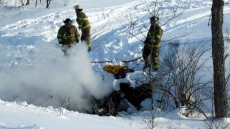RICHMOND, B.C. — Field technicians on the hunt for invasive species used to go on foot, by canoe or relied on satellite photographs taken from outer space.
But an ecologist who dispatched a drone to detect invaders in a British Columbia wildlife area is now recommending more remote-controlled robots do the difficult work.
"With a drone we're looking at pixel sizes that are teeny tiny. The resolution is amazing. You can literally zoom in and see all the petals on that flower," said Catherine Tarasoff, an adjunct professor at Thompson Rivers University.
"I've gotten past the steep learning curve and see the unlimited possibilities."
Tarasoff trialled the unmanned aerial technology last June at the Creston Valley Wildlife Management Area, an internationally protected wetland in south-central B.C.
The successful experiment was one of several cutting-edge advancements showcased in Richmond, B.C., on Tuesday in the ongoing battle against invasive species. More than 150 specialists from across the province are gathered for three days to discuss emerging issues and learn about the latest techniques to apply in their own regions.
"There's way more technology involved than there used to be," said Gail Wallin, executive director of the Invasive Species Council of B.C., which is hosting the forum. "We're in a whole new world now."
Wallin said technology has not only empowered the experts, but is making a dent by enlisting the public. For example, there are now smartphone apps that help identify and report what's in your backyard.
The council hopes to persuade people to take preventative actions against spreading invasives as a new social norm, just like recycling, she said.
"Now I can give you tools, and without being an invasive species specialist, you can go and find out what is invasive and what to do," she said, noting the strategies are also being disseminated over social media.
"You don't need to know about mussels or spartina or milfoil, or anything like that."
Prof. Tarasoff, who also runs her own consulting firm, ran the drone pilot project after she was approached by the wildlife area's manager, who suggested she try the increasingly popular technology.
So she sent two students and the drone out for two days to map a vast region being consumed by the yellow flag iris, a plant considered one of the province's worst invasives. The species with garden-flower appeal was used by landscapers all along the coast before ecologists realized it was swallowing aquatic environments and decimating habitats.
Tarasoff said the camera-mounted drone soared about 50 metres above to snap thousands of photos, which were stitched together into a massive final image. When viewed on a computer, she could move her mouse cursor over any spot to find out its GPS location. The data was handed over to experts tasked with weeding out the invader.
Drones could save money over the long-term and provide an alternative to dangerous, labour-intensive foraging, she said. Her next goal is to train a "smart drone" that can determine on its own which species must be photographed.
Other novel techniques gaining traction and reducing human error include sniffer dogs and DNA analysis, the forum heard.
Cindy Sawchuk, with Alberta's environment and parks ministry, described using canines' ultra-sensitive nose as a "gamechanger" for blocking the entry of zebra and quagga mussels on boats returning to the province after visiting foreign waters.
A double-blind trial that compared dogs to trained watercraft inspectors found the animals outperformed humans in every category, she said. Dogs detected mussel-fouled boats 100 per cent of the time, while the people only caught hitchhikers 75 per cent accurately.
Canada's federal fisheries department is also getting on board with more sophisticated detection methods, said Davon Callander, who works at its Pacific Biological Station in Nanaimo, B.C.
She said that invasive species can now be detected in environmental DNA, which is found abundantly in any ecosystem.
"It really is as easy as going out and getting a litre of water," she said, explaining how the samples are filtered for the "eDNA," which is then amplified, sequenced and matched to species' barcodes.
"Times are changing."





